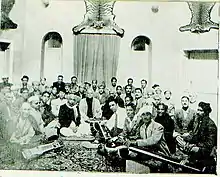Ustad Qasim
Qasem Jo (Pashto: قاسم جو;[1] 1878–1957), better known as Ustad Qasim (استاد قاسم), was an Afghan musician, composer, and singer. He is generally considered by musicologists to be one of the more prominent Afghan musicians of the 20th century,[2] being dubbed the "Father of Afghan Music".
Ustad Qasim | |
|---|---|
 | |
| Background information | |
| Birth name | Qasem Jo |
| Also known as | Qasimjo, Ustad Muhammad Qasim, Kassim Afghan |
| Born | 1878 Caubul, Afghanistan |
| Died | 1957 (aged 78–79) |
| Occupation(s) | Musician, composer, singer |
Early life and education
Qasim was of Kashmiri descent and was born Qasem Jo in the Gozar Barana district of the Afghan capital Caubul during the late 1870s.[2][3][4] He was descended from a musical lineage, as his father, Satar Ju, was also a musician, as well as a Nawab.[5][3] Qasim's father immigrated, on the invitation of a friend, from his native Kashmir to Afghanistan to provide his musical services to the country's monarchy, and it is here where Qasim was born.[4]
Qasim attended a madrassa which specialized solely in religious studies; thus he learned music theory as well as Urdu through his musician father.[4] Qasim learned to play musical instruments such as the sitar and tabla. He also learned many languages, including Dari from his mother, Pashto from his teacher, Urdu from his father, and Arabic from the religious school he attended.[4]
Career

During Qasim's life, Afghanistan was ruled by a monarchy. From the age of 20 onward, Qasim provided his musical services to various Afghan sovereigns, including King Abdur Rahman Khan,[5] who was known as the "Bismarck of Afghanistan" and who made him the royal court's singer.[4] Qasim often used the stage name "Kassim Afghan" (قاسم افغان) and other such pseudonyms incorporating the word "Afghan", to pay tribute to the country in which he was born.
Through his prominence and influence, Qasim ultimately became known as the "Father of Afghan Music" and the "Founder of Afghan classical music".[3][6] Music that Qasim composed in 1919 became used in a mujaheddin battle song which in turn became used in the national anthem of Afghanistan from 1992 to 2006.
Qasim influenced many Afghan musicians, including Rahim Bakhsh and Mohammad Omar.[4]
Personal life
Many of Qasim's descendants carried on his musical legacy, becoming musicians like him.[5]
References
- بصیراحمد حسینزاده (17 September 2011). "استاد قاسم باحافظ شیرازی در دربار عبدالرحمن" (in Persian). BBC News فارسی. Retrieved 21 January 2020.
- Adamec, Ludwig W. (2012). Historical Dictionary of Afghanistan (4th ed.). Scarecrow Press. pp. 358–359. ISBN 978-0-8108-7815-0. Retrieved 21 January 2020.
- Baily, John (2011). Songs from Kabul: The Spiritual Music of Ustad Amir Mohammad. Ashgate Publishing, Ltd. pp. 16–18. ISBN 978-0-7546-5776-7. Retrieved 21 January 2020.
- Momand, Wahid (2000). "Ustad Qasim". Afghanland. Archived from the original on 11 September 2002. Retrieved 21 January 2020.
- "Ustad Qasim Khan". Discogs. January 2020. Archived from the original on 10 January 2020. Retrieved 10 January 2020.
Ustad Qassem was an afghan [sic] musician coming from a Kashmiri immigrant family. His father was himself a singer and a lot of his descendants (his son Yacoub Qassemi or grandson Vaheed Kacemy) also became musicians. He was known to be the court's musician of king Amanullah in Afghanistan.
- National Museum of Asian Art. "Vocal Art Music in Afghanistan". The Art of Afghan Music: Ustād Mahwash, vocals. Washington, D.C.: Smithsonian Institution. Retrieved 10 January 2020.
The principal singer at that time was Ustad Qasem, the 'father of Afghan music.'
External links
| Wikimedia Commons has media related to Ustad Qasim. |
- A selection of Qasim's music in FLAC format at the Internet Archive
